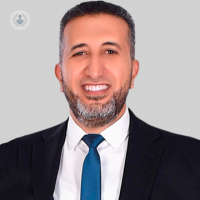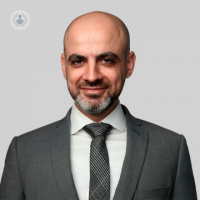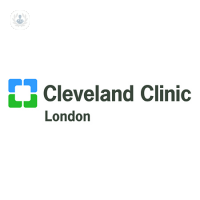What is an implantable cardioverter defibrillator (ICD)?
An implantable cardioverter defibrillator (ICD) is a device used as a preventative treatment for people thought to be at risk of cardiac arrest due to ventricular arrhythmia. It is similar to a regular pacemaker, but it is implanted and linked to the heart.
A specialist in fitting an implantable cardioverter defibrillator (ICD) device is a consultant cardiologist.

What is an ICD for?
An ICD can be used to treat ventricular arrhythmias, including atrial fibrillation or sustained ventricular tachycardia (i.e. when your heartbeat is unstable or irregular which could lead to complications at some point in the future).
How does an ICD work?
This device can sense if the heart is beating at a potentially dangerous abnormal rate, delivering a high intensity electrical shock to the heart to disrupt the abnormal heartbeat, returning it to a normal beating rhythm.
How can I prepare for this procedure?
The procedure for implanting a cardioverter defibrillator lasts around 90 minutes. It is done under local anaesthetic and the device is implanted into the thoracic cavity, near the collarbone. Before the procedure, the doctor will programme the device with all the necessary information about you and your condition. During surgery, the heart is monitored with cardiac pacing leads that can send an electrical signal to the cardiac muscle in case of abnormal heart rate.
Post-operative care:
Recovery will take around two weeks and the stitches are removed after ten days. Furthermore, you will need to go for periodic check-ups to make sure that the device is working correctly. Should there be any anomalies, or irritation of the surgical site, or even an ICD malfunction, you will need to go to the nearest A&E or urgent care centre.
11-13-2012 10-25-2023Implantable cardioverter defibrillator (ICD)
Dr Mokhtar Ibrahim - Cardiology
Created on: 11-13-2012
Updated on: 10-25-2023
Edited by: Jay Staniland
What is an implantable cardioverter defibrillator (ICD)?
An implantable cardioverter defibrillator (ICD) is a device used as a preventative treatment for people thought to be at risk of cardiac arrest due to ventricular arrhythmia. It is similar to a regular pacemaker, but it is implanted and linked to the heart.
A specialist in fitting an implantable cardioverter defibrillator (ICD) device is a consultant cardiologist.

What is an ICD for?
An ICD can be used to treat ventricular arrhythmias, including atrial fibrillation or sustained ventricular tachycardia (i.e. when your heartbeat is unstable or irregular which could lead to complications at some point in the future).
How does an ICD work?
This device can sense if the heart is beating at a potentially dangerous abnormal rate, delivering a high intensity electrical shock to the heart to disrupt the abnormal heartbeat, returning it to a normal beating rhythm.
How can I prepare for this procedure?
The procedure for implanting a cardioverter defibrillator lasts around 90 minutes. It is done under local anaesthetic and the device is implanted into the thoracic cavity, near the collarbone. Before the procedure, the doctor will programme the device with all the necessary information about you and your condition. During surgery, the heart is monitored with cardiac pacing leads that can send an electrical signal to the cardiac muscle in case of abnormal heart rate.
Post-operative care:
Recovery will take around two weeks and the stitches are removed after ten days. Furthermore, you will need to go for periodic check-ups to make sure that the device is working correctly. Should there be any anomalies, or irritation of the surgical site, or even an ICD malfunction, you will need to go to the nearest A&E or urgent care centre.


What to expect from your implantable cardioverter defibrillator (ICD) procedure
By Dr Syed Afzal Sohaib
2025-01-14
An implantable cardioverter defibrillator (ICD) is used to protect you from dangerous heart rhythms. Dr Afzal Sohaib, a leading cardiology specialist, provides you with a clear understanding of the benefits of an ICD and what to expect from the procedure as well as preparation and recovery. See more


How do implantable cardiovascular defibrillators work?
By Dr Fu Siong Ng
2025-01-12
Leading consultant cardiologist Dr Fu Siong Ng explains how implantable cardiovascular defibrillators (ICDs) monitor and correct the heart rate in this informative article. See more
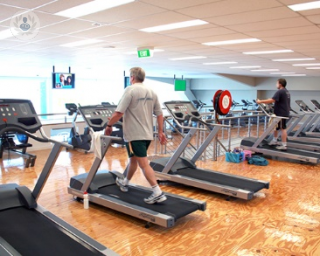

How an implantable cardioverter defibrillator (ICD) could save your life
By Dr Syed Ahsan
2025-01-10
An implantable cardioverter defibrillator (ICD) has life-saving capabilities. Discover what ICDs are, the types, when they are needed and the process of having one implanted, explained by Dr Syed Ahsan See more
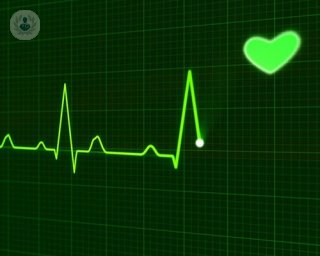

All about the the implantable cardioverter defibrillator (ICD)
By Dr Mark Mason
2025-01-02
Expert cardiologist Dr Mark Mason talks about the implantable cardioverter defibrillator, shedding light on when it is necessary to install one and what the surgical procedure is. See more
Experts in Implantable cardioverter defibrillator (ICD)
-
Dr Boon Lim
CardiologyExpert in:
- Atrial Fibrillation
- Syncope
- Arrhythmia
- Implantable cardioverter defibrillator (ICD)
- Cardiac (catheter) ablation
- Pacemaker
-
Dr Ravi Kamdar
CardiologyExpert in:
- Implantable cardioverter defibrillator (ICD)
- Arrhythmia
- Heart failure
- Hypertension (high blood pressure)
- Palpitations
- Syncope
-
Dr Syed Afzal Sohaib
CardiologyExpert in:
- Implantable cardioverter defibrillator (ICD)
- Atrial Fibrillation
- Pacemaker
- Palpitations
- Supraventricular tachycardia
- Syncope
-
Dr Simon Pearse
CardiologyExpert in:
- Heart failure
- Pacemaker
- Implantable cardioverter defibrillator (ICD)
- Cardiac resynchronisation therapy
- Chest pain
- Shortness of breath
-
Dr Fadi Jouhra
CardiologyExpert in:
- Shortness of breath
- Hypertension (high blood pressure)
- Chest pain
- Palpitations
- Heart failure
- Implantable cardioverter defibrillator (ICD)
- See all

London International Patient Services (LIPS)
London International Patient Services (LIPS)
5 Devonshire Place, W1G 6HL
No existe teléfono en el centro.
By using the telephone number provided by TOP DOCTORS, you automatically agree to let us use your phone number for statistical and commercial purposes. For further information, read our Privacy Policy
Top Doctors

Cleveland Clinic Moorgate Outpatient Centre
Cleveland Clinic Moorgate Outpatient Centre
55 Moorgate, EC2R 6BH
No existe teléfono en el centro.
By using the telephone number provided by TOP DOCTORS, you automatically agree to let us use your phone number for statistical and commercial purposes. For further information, read our Privacy Policy
Top Doctors

Cleveland Clinic London Hospital
Cleveland Clinic London Hospital
33 Grosvenor Place
No existe teléfono en el centro.
By using the telephone number provided by TOP DOCTORS, you automatically agree to let us use your phone number for statistical and commercial purposes. For further information, read our Privacy Policy
Top Doctors
-
London International Patient Services (LIPS)
5 Devonshire Place, W1G 6HL, W1G Marylebone LondonExpert in:
- Orthopaedic spinal surgery
- Plastic surgery, reconstructive and aesthetics
- Hand and wrist
- Otolaryngology
- Foot and ankle
- Knee
-
Cleveland Clinic Moorgate Outpatient Centre
55 Moorgate, EC2R 6BH, Central LondonExpert in:
- Digestive
- Cardiology
- Dermatology
- Diagnostic Imaging
- Diagnostics
- Obstetrics and Gynaecology
-
Cleveland Clinic London Hospital
33 Grosvenor Place, Central LondonExpert in:
- Cardiology
- Colorectal surgery
- Minimal access surgery (keyhole surgery)
- Gallbladder surgery
- Diagnostic Imaging
- Ultrasound
- See all
- Most viewed diseases, medical tests, and treatments
- Electrophysiology study
- Genetic testing
- Minimal access surgery (keyhole surgery)
- Heart murmur in children
- Aortic aneurysms
- Anxiety
- Long Covid
- Fainting in children
- Medicolegal
- Robotic surgery
